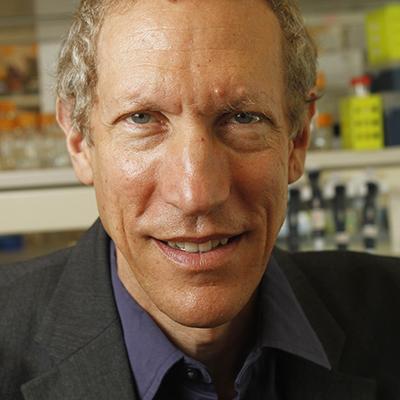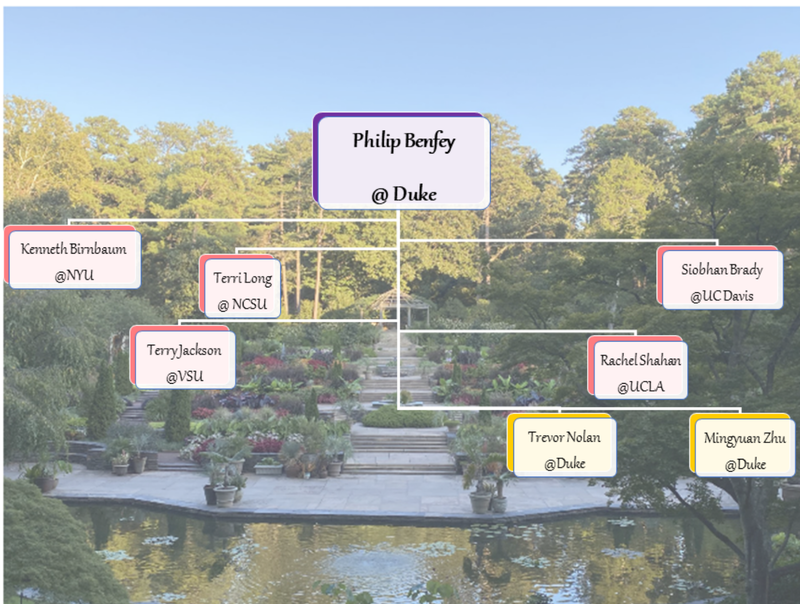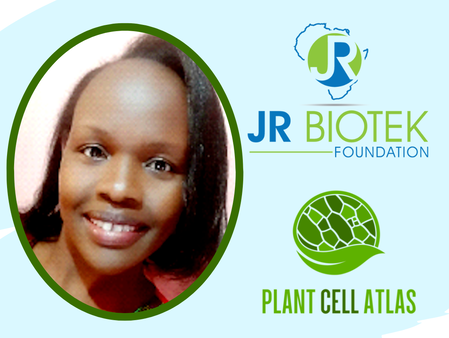|
Authors: Rachel Shahan, Trevor Nolan, Mingyuan Zhu Philip N. Benfey, an accomplished plant developmental biologist and mentor extraordinaire, passed away on September 26th, 2023. He was 70. Philip’s creativity, entrepreneurial spirit, enthusiasm for collaboration, and dedication to his mentees has left an indelible mark on the plant science community. Philip is survived by his wife, Elisabeth, and two sons, Sam and Julian. Philip began his independent career at The Rockefeller University in 1990. He moved to New York University in 1991 where he rose through the ranks to Full Professor. In 2002, Philip moved his lab to Duke University—where he chaired the Biology Department from 2002 to 2007—and subsequently led the Duke Center for Systems Biology until 2014. While at Duke, Philip was named the Paul Kramer Distinguished Professor of Biology in 2003, a fellow of the American Association for the Advancement of Science in 2004, elected to the National Academy of Sciences in 2010, and appointed an Investigator of the Howard Hughes Medical Institute in 2011. As a mentor, Philip taught his students and postdocs to be rigorous scientists and critical thinkers; he also encouraged creativity and out-of-the-box ideas. In total, over 80 postdocs and graduate students received their training in the Benfey lab. As a scientist, Philip was fascinated by fundamental developmental questions such as, “how do cells acquire their identities?” and, “how do tissues create a functional organ?”. To investigate the genes involved in these processes, Philip chose a simple but elegant model: the Arabidopsis root. Using this system, and eventually the roots of other plant species, the Benfey lab produced pioneering research for nearly four decades. Philip was an enthusiastic proponent of new technologies. His lab's innovative use of fluorescence-activated cell sorting followed by microarray and RNA-seq analyses led to the first spatiotemporal maps of gene expression in plant roots (1,2). These advances were pivotal in enabling the annotation and interpretation of the first plant single cell RNA-seq datasets, which were generated from Arabidopsis roots. Philip's contributions helped lay the groundwork for the initiatives of the Plant Cell Atlas, both through the thriving network of researchers trained in his lab (Fig 1) and the biological and technological breakthroughs that he spearheaded. Philip's enthusiasm for the adoption of single-cell transcriptomics led to the creation of detailed transcriptional maps of Arabidopsis and rice roots. His long-term interest in imaging technologies resulted in the development of a custom light sheet microscope to quantitatively track transcription factor dynamics underlying formative asymmetric cell divisions in live roots. These efforts enabled the Benfey lab to generate new insights into cell identity specification, molecular phenotypes in developmental mutants, cell type-specific hormone responses, and root-soil interactions (3,4,5). In alignment with the PCA goals to produce community resources, all raw and processed sequencing data, metadata, and code is publicly available alongside each of these recent publications. The comments that follow are reflections on Philip's significant influence on the Plant Cell Atlas community, particularly regarding advancements in single-cell genomics. References:
Testimonials: I joined Philip’s lab as a postdoc in June 2018. At the end of my first week, I attended the symposium organized by Benfey Lab alumni in honor of Philip’s 65th birthday. I was struck not only by the outstanding research in the labs of Philip’s former trainees but also by the camaraderie and collaboration between lab alumni. It was clear that Philip’s lab produced an ecosystem of researchers who freely share ideas, resources, and expertise. This collective spirit is also reflected in the Plant Cell Atlas community. As the co-chair of the PCA Single-Cell Sequencing committee, I am proud to contribute to PCA initiatives together with several of Philip’s former trainees and many colleagues who worked closely with Philip. Based on my experiences with single cell RNA-seq protocol development and data generation as a postdoc, I am especially committed to the PCA’s goal of openly sharing resources and expertise. To this end, the Single-Cell Sequencing committee organized two workshops this year to share information about experimental design, sample preparation, and data analysis. While I will miss Philip and his outstanding mentorship, I will carry the lessons that I learned as his postdoc with me as I continue to contribute to the PCA and as I start my own lab at UCLA. - Rachel Shahan Single-cell genomics was just ramping up in plants when I came to Philip’s lab. At the time, most researchers were profiling a handful of samples, mostly from untreated roots. In his typical style, Philip proposed the bold idea to perform time course scRNA-seq of environmental responses. Since such a time course hadn’t yet been performed and my background was in brassinosteroid signaling, we decided to examine brassinosteroid responses as a test case. Although we initially expected that we would simply recover known sites of action, we were pleasantly surprised when an overlooked cell type seemed to be responding at a particular developmental stage. This is something that would have been difficult to pick up with previous technologies that conflated cell type and/or developmental stage. This exemplifies Philip’s approach to research: he shattered paradigms by pioneering technologies, listening to the data, and appreciating the unexpected. Philip was equally enthusiastic as spatial technologies started to be applied to plants; he encouraged me to seek training to apply these exciting techniques to my interests in root growth and cell elongation. I will be forever grateful for the years I spent in Philip’s lab. His vision, kindness, and ability to plan strategically were unmatched. He demonstrated what it means to be a leader and that it’s possible to be a top-notch scientist while having a thriving life outside the lab. - Trevor Nolan When I joined the Benfey lab in 2020, the single-cell RNA-sequencing (scRNA-seq) on rice roots was already underway, led by two talented Postdocs Isaiah Taylor and Trevor Nolan. It has been a great pleasure joining the team and learning everything from scratch. Over the course of a challenging yet rewarding year, we harvested tens of thousands of high-quality cells to construct a reference root atlas. However, a significant hurdle emerged: confidently annotating the identified cell clusters in our scRNA-seq atlas. Philip, with his insightful research instincts, initiated a collaboration with Resolve Biosciences. This led to the pioneering application of a multiplexed fluorescence in situ hybridization technology, Molecular Cartography, on rice roots. I vividly recall Philip's enthusiasm, evident in his frequent email checks on the day we received the data and his prompt response to my updates that evening. We validated over 40 reliable markers with just two rounds of experiments. However, this was not the end of our journey. Philip, true to his nature as a trailblazer, sought collaboration with soil experts Malcolm Bennett and Bipin Pandey. Together, we pioneered the application of both single-cell and spatial transcriptomics to roots grown in soils, unveiling cell-specific responses to soil compaction at the single-cell level. Engaging in this groundbreaking work not only allows me to learn new techniques and delve into specific scientific questions but also instills in me the mindset of continuously challenging myself to explore uncharted territories. I am deeply grateful for the years spent together with Philip. His unwavering dedication to pushing the boundaries of science motivates me to keep going. - Mingyuan Zhu Philip could hold court with his views on research and life, but he also practiced the art of understated phrases and gestures that spoke volumes. He could steer the lab’s projects with a few choice words, such as ”It’s in the realm of possibilities.” In some contexts, that was an “I doubt that can work” and, in others, an indication to “give it a try”. I was working for at least two and half years on our protoplast generation cell sorting marker idea (it was clearly in the give-it-a-try realm of possibilities category). Two trips to David Galbraith’s lab in Arizona. Two failed proposals to NSF and NIH. We weren’t sure it was working. Our best colleagues were skeptical. But we adjusted the methods and lightning struck. I brought the in situ hybridization to Philip’s little office overlooking Greene Street at NYU with the definitive evidence that it worked, proudly plopped the in situs on his desk, and stood waiting for his reaction. He stared down at the in situ printouts, he didn’t say a word, he didn’t lift his head. He just held up one of his extra-long arms for a victory handshake. Twenty years later I don’t remember the moment I looked at the in situs under the microscope, but I do remember the handshake. On my toughest days, it always makes me smile. - Ken Birnbaum As a graduate student, I remember reading the too-incredible-to-believe papers coming out of the Benfey lab, describing how cell type-specific expression could be profiled using a handful of transgenic lines and FACS. At the time I thought it was crazy. Little did I know that this prescient technology would enable an entire revolution in how we study gene expression in plants, and that I would turn into a fierce advocate for the approach. I had the fantastic opportunity to meet Philip at a conference he and I were both presenting at, incidentally, on the same topic (integration of plant single-cell datasets), at the same time. I got an ominous email the day before my presentation, asking to meet. At first, I was terrified that I was now competing with not only an amazing scientist, but a Howard Hughes Investigator to boot, and was about to get completely scooped. Instead, he expressed a desire to collaborate, as he felt that it was better to build coalitions rather than compete, especially when we can help each other. This was instantly disarming, and resulted in one of the most fun experiences I’ve had in my scientific career. I think this collaborative spirit also permeates the generations of scientists that trained in Philip’s lab, many of whom are as talented, kind and collaborative as he was. He was a true asset to the community, and will be sorely missed. - Benjamin Cole There are many things to admire about Philip Benfey, but one thing that stood out for me is how big he thought. I attended a seminar of his as I was about to go on the job market for faculty positions. He had this fantastic line: “What is your twenty year question?”. In other words, what area could you spend your whole career working on, and perhaps not even solve. As a postdoc, I wasn’t used to thinking at such a grand scale. We tend to think experiment-to-experiment, maybe grant-to-grant at most. To know that the job requires rewiring your thinking to operate at this scale was very instructive for me. I still use his line in career workshops to postdocs and grad students! Philip will indeed be missed. - Aman Husbands I was super-inspired by Philip Benfey, Ken Birnbaum and colleagues’ 2003 paper. Although I had just set up the server that would eventually become the BAR, it would be a few more years before I invented the eFP Browser. One of the first views that we created for the Arabidopsis eFP Browser was a cell-type-specific view that included the Birnbaum et al. 2003 data. I was also inspired to actually do some cell-type-specific expression profiling and even managed to publish in the area, after training in Ken Birnbaum’s lab at NYU (with the help of Bastiaan Bargmann). The most detailed FACS-based root data set that we included in the eFP Browser was the Brady~Benfey paper from 2007. Soooo much cool data! I was fortunate enough to meet Philip in 2008 - he kindly agreed to come to the Canadian Plant Genomics Workshop I was co-organizing that year. His harrowing tale at a dinner during the workshop of being in NYC during 9/11 has stuck with me, as has his collaborative spirit. RIP Philip, you will be missed. - Nicholas Provart As a PhD student at Duke University, Dr. Ashley Chi insisted that if I wanted to join a plant biology lab then I must go to The Benfey Lab. I remembered seeing Philip during interview weekend with one of his graduate students, Todd Twigg showing off the Root Array. I thought it was a cool concept and gadget so I set up a meeting and he gave me a much needed final rotation. It is one of the best decisions I ever made. I was able to join the lab of a titan in the field. I spent my best years in the Benfey lab surrounded by people I absolutely loved. I cherish every memory and moment I spent in his company.
I remember his lessons and words to me vividly. Philip Benfey gave me all the tools I needed to succeed and achieve my dream of becoming a geneticist. He believed in me when many of the leaders of my program were ready to give up on me. Philip refused. He recognized that my difficulties could be overcome and he had the resources and people in his lab that could prove it. That’s exactly what we did. It wasn’t long before I began to excel and make a bit of a name for myself by utilizing skills that simply needed to be focused and channeled properly. My peers were telling tales of desperation and disdain for their advisors, lab, and projects while I told a story of living my best life – being surrounded by brilliance and compassion everyday. In the Benfey lab, I felt at home surrounded by family and it was the only place I wanted to be. Philip is more than a mentor or someone to look up to, he is a clear depiction of countless qualities a person would want to embody and employ in themselves. Philip became a role model to me and remains one of only two or three I have ever had. He remains so to this day and I strive to live up to his guidance over the years. Calm, cool, and collected – Philip always said the right thing, the right way, at the right time. I can never forget that with one word, “Very”, he broke me down and inspired me to collect myself, improve, and continue to chase my dream simultaneously. He was an imposing figure yet delicate. Despite knowing he was going to be easy and kind when you met with him, you still were nervous. Always nervous. Nervous that you would say the wrong thing or somehow let him down. You always wanted to bring your best to his desk and attention. I can never thank him enough for all he has done for me. I can never show the gratitude and thanks that I have for him. He is the greatest and will forever be dear to me. - Terry L. Jackson
0 Comments
By Kevin Cox Jr. From July 30th - August 4th, 2023, 120+ attendees gathered in Ventura, California for the first Gordon Research Conference (GRC) in Single-Cell Approaches in Plant Biology. This conference was organized by committee members of the Plant Cell Atlas, who sought to bring together a community of individuals that are using technologies in plants to dissect the functions and interactions of specialized cell types and their capacity to respond to environmental changes, interact with other organisms, grow, and reproduce. In this blog post, I recount interviews of five individuals that attended the conference and summarize their responses to some of the questions I asked them. Motivation for attending the conference All the interviewees mentioned that there was a lack of conferences focused on single-cell approaches in plants. Each of them was working on projects related to this area and were excited to finally have a conference that allowed them to discuss common obstacles and discover different methods that would be applicable to their projects. “I wanted to attend the GRC to share and get feedback and advice on my single-cell project. I was also excited to go to a smaller conference!” – Lily O’Connor, Graduate Student, Washington University in St. Louis/Donald Danforth Plant Science Center Favorite thing about the conference While there was no question that the science being discussed was outstanding, a common theme that was brought up as an answer to this question was the interactions with other people. GRCs are a unique setting where they bring together a small community, in a small, isolated space to not only discuss science directly related to their projects, but to also build networks and potential collaborations with other people. In addition, the daily afternoon break, the nightly social at the end of each day, and the frequent coffee breaks in between sessions provided some fun interactions. “For me, it was meeting other people. I’m new to this area of science and meeting a lot of people that I have previously known online has been really good.” – Shuyao Kong, Graduate Student, Cornell University Speaker selection The interviewees were impressed by the speaker selections, particularly with the number of early career researchers presenting. The diversity of topics covered in this conference was also a strength, as it covered a huge range of biology from single-cell profiling to whole plant phenotyping. Moreover, the organization of the talks was well-curated and thought out that allowed the attendees to see how these different areas of biology can ultimately be applicable to their research. “The speaker selection covered a wide range of biology – I liked that personally as it helps you think broadly about the types of techniques you can incorporate in your projects. I can’t pick a favorite session because there were too many good ones!” – Macy Vollbrecht, Graduate Student, Stanford University Visibility of the Plant Cell Atlas When I asked about whether they knew about the Plant Cell Atlas (PCA) before the GRC, the responses were mixed. Responses ranged from knowing everything about the PCA, to recognizing the name but unaware of what the PCA did, to never hearing about it at all. After the conference, all of them were very supportive of its mission, the activities it produces, and how it was composed of community members from diverse career stages and backgrounds. “A lot of the conversations I have had with other attendees mentioned that this conference has been a really good recruitment tool for people that might be interested in joining the Plant Cell Atlas committee. It’s also a good networking opportunity for those that are already apart of the PCA.” – Dr. Heather McFarlane, Assistant Professor, University of Toronto Looking ahead to the GRC in 2025 Overall, there was a strong consensus from the interviewees (and from other attendees I informally chatted with) that this was a very successful meeting. I personally can’t wait to return for the next PCA GRC in 2025 and seeing this community again. “Oh, absolutely and I would like to be a speaker at that conference! It seems like the perfect place to get feedback and disseminate information on single-cell projects in plant biology.” – Dr. Bryan Ramirez-Corona, Postdoctoral Associate, University of Washington Click on "Comments" below to leave a comment.  Meet Oluwatoyosi Adaramodu, also known as Lisa, co-founder of Afro in Bio and winner of the 2023 PCA Travel Award. She will be presenting a poster at the Single-Cell Approaches in Plant Biology Gordon Research Conference in Ventura, CA on July 30 - August 4, 2023. Read an interview with Oluwatoyosi (Lisa) Adaramodu below! Interviewer: Can you share a bit of your background?
“I am a proud Nigerian and the daughter of a low-income, single parent. I earned my undergraduate degree in plant biotechnology from a Nigerian institution and completed my master’s degree in China at the University of Chinese Academy of Science last year. Each identifier holds significance to me because there was a time when I believed it wasn’t possible to embody all of these at once. I experienced firsthand the limitations that STEM education in Africa presents for students like me. The lack of laboratories, qualified STEM teachers, high student-to-teacher ratios, and limited financial resources meant that STEM education in many Nigerian universities was limited to theoretical learning with little to no research opportunities. My interest in plant molecular research became more apparent when I participated in a six-month Plant Biotechnology training program at the National Biotechnology Development Agency (NABDA) in Abuja, Nigeria, as well as the National Centre for Genetic Resource and Biotechnology in Ibadan, Nigeria. These experiences helped me to apply what I had learned in class to real-world research. Desiring to expand my knowledge of plant molecular biology and genome engineering, I applied for the Plant Developmental Biology master’s program at the Institute of Botany, University of Chinese Academy of Science. I applied through the Belt and Road Fellowship program and was fortunate to have Professor Jing, a renowned plant genomics researcher in China, supervise me. Currently, I am a first-year PhD student at the University of Pennsylvania, under the guidance of Professors Brian Gregory and Brent Helliker.” Interviewer: What are your research interests that you hope to pursue? “As a new graduate student at UPenn, my research interests focus on crop improvement in the face of climate change, specifically through the adaptation of grasses to drought stress. My interest in crop plants began during my undergraduate years, and continued through my master’s degree, where I conducted research on 250 sorghum lines from different origins across the globe to examine their response to salt stress through genome-wide mapping, identifying novel QTLs/genes, and screening novel germplasm for salinity-tolerance. This research formed the foundation for my current research interests. I am now interested in studying bulliform cells, a type of cell found only in grasses, and their role in the adaptation of grasses to drought stress. Through my research, I hope to contribute to the development of more drought-tolerant crop varieties, ultimately contributing to the stability of food systems in the face of climate change.” Interviewer: How do you think the Plant Cell Atlas benefits your research? “The Plant Cell Atlas provides me with valuable opportunities to further my research career in academia, as well as to enhance my current research on the potential of bulliform cells in food security. One of the main benefits of the Plant Cell Atlas is the opportunity to connect with leading experts in plant single-cell research. This allows me to gain valuable insights and perspectives on the latest research and advancements in the field, which would in turn inform my own research and help me to identify new areas of investigation. Additionally, the Plant Cell Atlas provides me with opportunities to network with other researchers and scientists, both established and early career, which could lead to future collaborations and opportunities for further research.” Interviewer: You are a co-founder for Afro in Bio. Can you share more about how that got started, what is it about, and what are some of the goals of Afro in Bio? “My friend, who is a PhD student at Yale, and I started Afro in Bio in 2022. It is a community for Africans in biological science around the world. We wanted to create a space where African scientists could connect with each other, share their experiences and knowledge, and support each other in their careers. The goals of Afro in Bio are to provide a platform for African scientists to connect, share resources and information, and support each other in their career development. We also aim to promote diversity and inclusion in the field of biological science by highlighting the contributions of African scientists and providing opportunities for underrepresented groups to succeed in the field. Since its inception, Afro in Bio database has grown to include members from various countries across the globe. We believe that by bringing African scientists together, we can create a supportive community that will help to break down barriers and promote success in biological science.” Interviewer: What are your future career aspirations? “Upon completion of my PhD degree in biology, my future career aspiration is to secure a postdoctoral fellowship position that will allow me to delve deeper into my research interests in plant stress biology. Specifically, I hope to gain a more comprehensive understanding of the mechanisms underlying plant response to environmental stressors and the potential applications of this research in improving food security and sustainable agriculture practices." Interviewer: How did you find out about the PCA Travel Award and what motivated you to apply? “I found out about the award and the conference through one of the professors in my department whose class on cell signaling I took last semester. I told her about my interest in Bulliform cells and single-cell transcriptomics in plants.” Interviewer: What are some things you are looking forward to when you attend the Gordon Research Conference in Single-Cell Approaches in Plant Biology this summer? “I am excited about attending the Gordon Research Conference in Single-Cell Approaches in Plant Biology this summer, as I am looking forward to presenting a poster on my research for the first time. Additionally, I am eager to meet researchers whose papers I have read, which I hope will provide me with valuable insights and potentially even lead to future collaborations. My current research focuses on the potential of bulliform cells to improve food security, as it has been demonstrated that these cells have a crucial role in plant tolerance to environmental stress. Attending the conference would allow me to learn about the latest research on plant stress response, which would inform my own research and help me to identify new areas of investigation. In addition, by presenting my own research on bulliform cells at the conference, I would be able to receive feedback and comments from experts in the field, which would be extremely valuable to improve my research.” Interviewer: Dr. Kevin Cox. Written responses by: Oluwatoyosi (Lisa) Adaramodu If you are interested in Oluwatoyosi (Lisa) Adaramodu’s work, please follow her on Instagram (@the_nigerian_phd), Twitter (@yoursorghumgirl), or contact her through email ([email protected]). Click on "Comments" below to leave a comment. Meet Joan Josephine C. Kimutai, winner of the “Best Talk” award at the JR Biotek-PCA Africa Ph.D. Scholars Mentoring Program Celebration. Joan is a team-oriented plant breeder with experience in classical and molecular methods of crop improvement. Her goal is to develop stress-tolerant crop varieties suitable for smallholder farmers in different agro-ecologies of Kenya and sub-Saharan Africa in general. As a child, Joan dreamed about pursuing a career in medical science. When she grew up, Joan enrolled in a Bachelor of Science Degree program in Biotechnology at Kenyatta University. However, after learning about plants and their importance in food and medicine, she developed a strong interest in plant biotechnology and dedicated herself to the field. After years of training, Joan now holds a Master of Science degree in Plant Breeding and Biotechnology (The University of Nairobi) and is a Ph.D. fellow at the West Africa Centre for Crop Improvement (WACCI), University of Ghana and is pursuing Plant Breeding. She is currently a visiting student at the International Maize and Wheat Improvement Center (CIMMYT, Kenya). At CIMMYT, she is conducting her Ph.D. research titled “Genetic Analysis of Striga (Striga hermonthica (Del)) Benth. Resistance in Maize”. The objective of the research is to contribute to increased maize genetic gains through the application of genomic approaches in the development of Striga-resistant varieties. In addition to her studies, Joan previously worked at Agriscope Africa Limited. She has diverse experience with field and greenhouse experimental procedures, molecular techniques (including plant tissue culture procedures), and statistical, genetic, and molecular data analyses using various software and bioinformatics tools. Joan is a team player with excellent communication, managerial, and leadership skills. She is a dependable, extremely self-motivated, innovative, open-minded, and charismatic learner who is passionate about improving livelihoods through the development of climate-resilient, disease, and pest-tolerant crops for improved food security and nutrition. Joan is currently working on finishing her Ph.D. project and will be looking to join a breeding program or a postdoctoral research position soon. At this time, she is very passionate about learning more about GWAS, genomic selection, and genomic prediction tools, and gaining hands-on experience. If you are interested in Joan's work, please follow her on Twitter (@Joan458), LinkedIn (Joanne Kimutai), or contact her through email ([email protected]). Learn more about Joan by watching the interview above conducted by PCA members Dr. Kevin Cox, Dr. Terry Jackson, and Elena Lazarus. (Video edits by Terry Jackson).
Click on "Comments" below to leave a comment. |
Archives
December 2023
Categories |
MICHIGAN STATE UNIVERSITY LAND ACKNOWLEDGEMENT
“The Plant Cell Atlas operates predominantly out of Michigan State University. We acknowledge that Michigan State University occupies the ancestral, traditional, and contemporary Lands of the Anishinaabeg – the Three Fires Confederacy of Ojibwe, Odawa, and Potawatomi peoples. We affirm Indigenous sovereignty and hold Michigan State University accountable to the needs of American Indian and Indigenous peoples.”
“The Plant Cell Atlas operates predominantly out of Michigan State University. We acknowledge that Michigan State University occupies the ancestral, traditional, and contemporary Lands of the Anishinaabeg – the Three Fires Confederacy of Ojibwe, Odawa, and Potawatomi peoples. We affirm Indigenous sovereignty and hold Michigan State University accountable to the needs of American Indian and Indigenous peoples.”




 RSS Feed
RSS Feed



